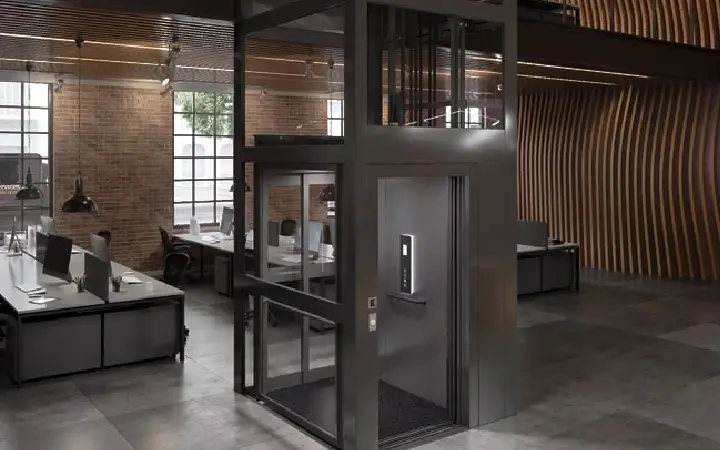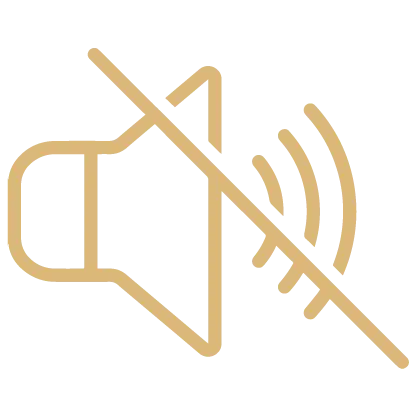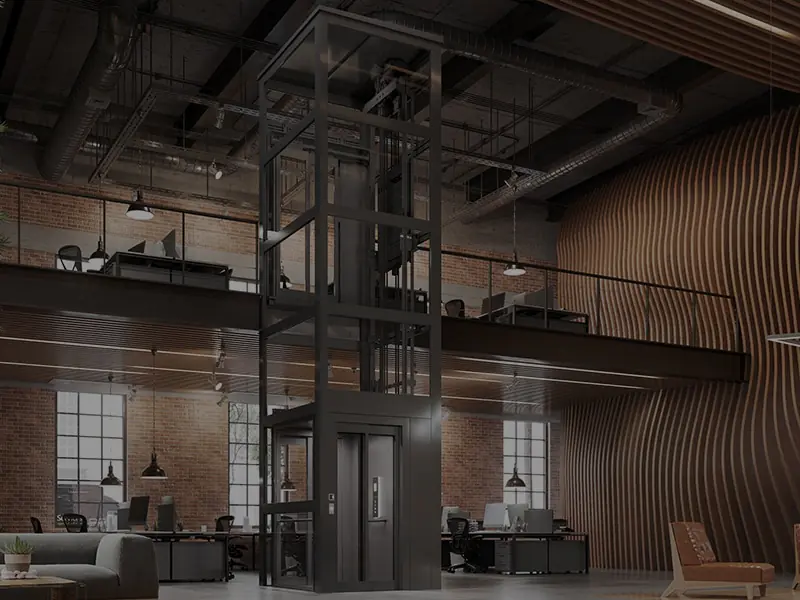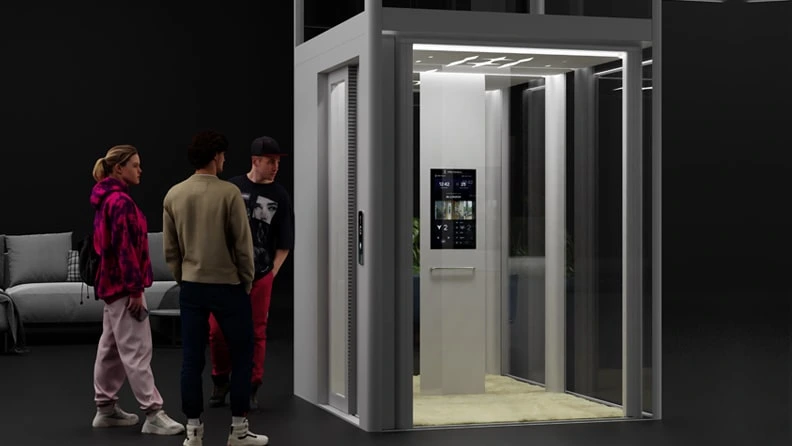
E300 The World’s Best Home Elevator
With the Patented Cogbelt technology along with a rivet-less shaft, E300 are at least 7 years ahead of other elevator manufacturers globally. While other elevator manufacturers are finding it difficult to even match the current standards of home elevators as per MD 2006 42 EC and EN 81–41, E300 has set unmatched levels of standards by getting a SIL 3 Certification. Possibility of updating the elevator and the option to diagnose the elevator remotely using the Canbus Connection leads E300 to dominate the Home Elevator Industry without a doubt.
Why Choose E300 Home Elevators?
Experience the pinnacle of home elevator technology with the E300, designed for unparalleled safety, comfort, and style.

Quiet and Smooth
With its patented gearless cogbelt drive, the E300 glides quietly and smoothly. It removes noise and vibration to create such a smooth ride that you will hardly know that it is moving. It is a perfect addition to homes where comfort and elegance go hand in hand.

Safe and Reliable
With German engineering by TK Access Solutions and EN 81-41 European certification, the E300 offers world-class safety. With features like battery-operated emergency lowering and advanced error notifications, the E300 can enable complete peace of mind. Every ride is designed to protect you and your family.

Stylish and Customisable
The E300 seamlessly brings style into your interiors with its designer cabins, elegant finishes, and custom options that are sure to suit your style. It comes down to whatever textures and colors and any premium material you could imagine—we create it. It is more than just a lift—it is an extension of your home’s personality.

Space Efficient
With no overhead, machine room, or deep pit, the E300 can be installed in the most compact areas. Designed to fit, the E300 features custom-made dimensions for your home and is perfect for installation, whether indoors or outdoors. Smart design that is space efficient and customizable—that is the E300.
Detailed Technical Specifications for E300 Home Lifts
Dive into the detailed specs of the E300 Home Lift and discover the innovation, safety, and comfort behind every ride.
| Feature | Specification |
|---|---|
| Technical compliance | Machinery Directive 2006/42/EC |
| Standard | EN 81-41 |
| Drive system | Gearless cogbelt drive |
| Max Speed | 0.15 m/s up to 0.4 m/s |
| Max Load | Up to 400 kg |
| Travel height | Up to 18,000 mm |
| Number of Doors | Max. 12 doors per lift |
| Pit | 140 mm (no pit is required in case of threshold/ramp) |
| Shaft Top Height | 2500 mm in the existing shaft / 2600 mm with its own shaft |
| Number of Stops | Max. 6 stops per lift |
| Installation Environment | Indoor / Outdoor |
| Emergency Lowering | Battery-operated emergency lowering |
| Control Voltage | 24V |
Elevating Homes for Over a Decade—Hear from the Families Who Trust Elite Elevators
Don't Settle for Ordinary. Choose the E300.
Safety Features of the E300 Cogbelt Home Elevators
Redefining safe home mobility, the E300 Cogbelt is trusted by homeowners who value security, elegance, and confidence in every floor-to-floor journey.
Automatic Rescue Device (ARD) - In the unfortunate event of a blackout, the cabin moves to the nearest floor and opens the door so the user can exit safely.
EN 81-41 Certified - Complies with strict European safety standards, ensuring unmatched reliability.
Advanced Error Notification System (AENS) - Continuously monitors operational performance; any irregularity will be instantly identified.
In-Cabin GSM Phone - Offers you the ability to dial out and connect to an operator or customer care, day or night.
CAN bus Connection (CCT) - Immediate access for diagnostics and software updates from your mobile device. Our engineers can enhance your elevator management with proactive safety features.
Dual Emergency Brakes - The high-precision brake will instantly engage in the event of overspeed or a faulty system; your safety is a priority, and we never forget that.

Personalised Home Lifts That Reflect Your Style, Space, and Sophistication
Luxury is personal. Design your home lift with custom features that align with your aesthetics, functionality, and interior elegance.




Why Elite Elevators Stands Out as the Best Home Lift Solution?
Redefine your home mobility with Elite Elevators, offering stylish, safe, and reliable lifts for a seamless living experience.
Discover E300 Cogbelt Home Lift Pricing for Modern Residences
Experience modern living with the E300 Cogbelt lift — elegant, safe, and efficient, with transparent home lift pricing crafted for today’s residences.
| Model | G+1 | G+2 | G+3 | G+4 | G+5 |
|---|---|---|---|---|---|
| Standard E300 - Sliding Door - Metal TKE Shaft | INR 66,46,249 | INR 73,25,059 | INR 80,03,892 | INR 87,92,598 | INR 95,81,305 |
| Standard E300 - Sliding Door - Client Masonry Shaft | INR 48,23,740 | INR 51,89,016 | INR 55,54,290 | INR 59,19,566 | INR 62,84,839 |
| Elegance E300 - Sliding Door - Metal TKE Shaft | INR 73,72,921 | INR 80,51,743 | INR 87,30,563 | INR 95,19,270 | INR 1,03,07,975 |
| Elegance E300 - Sliding Door - Client Masonry Shaft | INR 53,71,652 | INR 57,36,928 | INR 61,02,204 | INR 64,67,478 | INR 68,32,753 |
What Our Customers Say About Us
Aggregate Review Rating
5/5 Stars ★★★★★ (889)





Our Home Lift Brochures
Just like a car, you can take an Elite home lift for a test drive! Schedule an appointment at any Elite Elevators Experience Centre nearest to you for a personalised tour.
Download Brochure
Frequently Asked Questions
1. How does the E300 Cogbelt Home Elevator differ from other home elevators?
The E300 is powered by our patented gearless cogbelt technology, engineered in Germany by TK Access Solutions. It provides a robust, smooth-gliding ride experience with very little noise. Importantly, it meets the European Declaration of Conformity EN 81-41 Safety Standard, making it one of the safest, most advanced home elevators that you will find anywhere in the world.
2. Can the E300 be installed in an existing residence without renovations?
Absolutely! The E300 requires no overhead, separate machine room, or deep pit. The E300 is available in custom sizes and dimensions and is compact enough to fit inside a brand new home as well as current residences, and can even be installed outdoors.
3. What safety features are included in the E300?
The E300 home elevator includes an Automatic Rescue Device (ARD), emergency braking devices, an in-cabin emergency GSM telephone, advanced error notifications, a battery backup, and a patented seismic resistance shaft. All of these safety features ensure that the E300 is as safe as possible for you at all times.
4. Can I modify the design of the E300 so it suits my interiors?
Certainly! The E300 home elevator is fully customizable: cabin styles, finishes, colors, textures, and accessories all allow its use in varied interior styles; the premium Elegance Cabin collection even has exclusive materials and finishes inspired by Italian craftsmanship.
5. How much load can the E300 carry, and how many stops does it support?
The E300 supports up to 400 kg and a maximum of 6 stops per lift, making it ideal for multi-level luxury homes.
6. How much does the E300 Cogbelt Home Elevator cost?
The cost of the E300 depends on factors like the number of stops, custom finishes, and installation requirements. Since it is a tailor-made elevator, we provide personalized quotes after assessing your home and preferences. Call us at +91 93616 13131 to get a quote.
7. How long does it take to install the E300?
Installation time is typically much faster than conventional elevators. Depending on site readiness and specifications, the E300 can usually be installed in 2–3 weeks. Our team ensures a smooth, hassle-free process from delivery to final handover.


